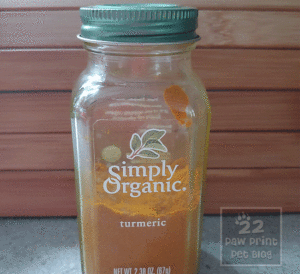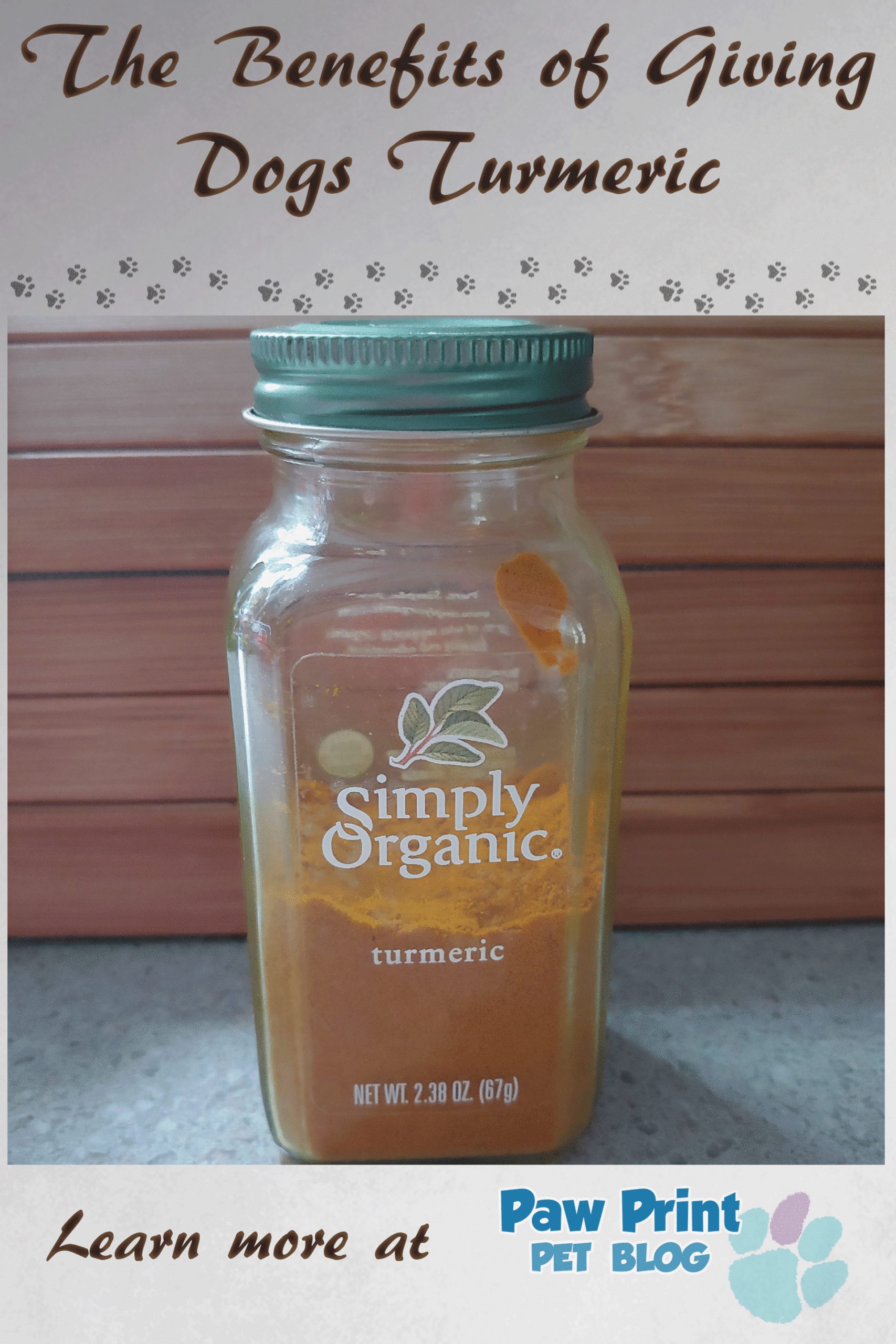
Post Contents:
Turmer- What!?
Despite buying turmeric as a seasoning for my own food, and using it for my dogs, I’m still never 100% convinced that I’m pronouncing it correctly!
What is Turmeric?
Many people probably think of turmeric as a food seasoning. It’s a plant in the ginger family. Native to the Indian subcontinent and Southeast Asia, the rhizomes of the turmeric plant are commonly ground for use in cooking. Popular in curry recipes, turmeric is described as having an earthly, bitter flavor. The ground plant has a vibrant orange color that can also be used to dye things, or as a food colorant. Be careful when using turmeric, as that lovely golden orange color can stain surfaces!
Turmeric, by means of one of it’s main components, curcumin, is touted as having a plethora of health benefits – everything from reducing dental plaque to fighting cancer!
So How is Turmeric Relate to Dogs?
 The curcumin in turmeric is thought to have anti-inflammatory and antioxidant properties. There are SO many dog health conditions that cause painful inflammation. Many owners swear by supplementing with turmeric (via something called “golden paste”, more later) to treat conditions such as arthritis, joint issues, GI issues, allergies, general pain, and more! Turmeric is also thought to benefit dogs’ skin and coat health. In a 2014 study done with humans, it was concluded that turmeric “extracts are as effective as ibuprofen for the treatment of knee osteoarthritis.” In fact, patients treating osteoarthritis reported less GI related side effects than patients using ibuprofen.
The curcumin in turmeric is thought to have anti-inflammatory and antioxidant properties. There are SO many dog health conditions that cause painful inflammation. Many owners swear by supplementing with turmeric (via something called “golden paste”, more later) to treat conditions such as arthritis, joint issues, GI issues, allergies, general pain, and more! Turmeric is also thought to benefit dogs’ skin and coat health. In a 2014 study done with humans, it was concluded that turmeric “extracts are as effective as ibuprofen for the treatment of knee osteoarthritis.” In fact, patients treating osteoarthritis reported less GI related side effects than patients using ibuprofen.
Curcumin is also said to have antioxidant properties. Studies have suggested that curcumin has cancer fighting properties, although further testing is needed.
Pain medications for dogs, especially NSAIDs, are notorious for potentially causing quite a few negative side effects. These can include things like vomiting, diarrhea, depression, loss of appetite, intestinal ulcers, liver failure, and kidney failure. It makes sense why owners with dogs who have chronic, painful conditions, such as arthritis, would want to look for alternative treatments for their pet’s pain. Nobody wants to see their animal companion in pain, but the thought of side effects like kidney failure is scary too!
How Much Turmeric Can Dogs Have?
The recommended dosage of turmeric for dogs is 15mg to 20mg per pound, once a day. This equals out to 1/8 to 1/4 of a teaspoon per pound. However, it’s a good idea to start with a smaller dose and work your way up, to asses how your dog handles turmeric. I’d start with a half, or even a fourth, of your dog’s dosage and then increase the amount given slowly over time. Turmeric leaves the body quickly, so breaking up your dog’s daily dosage into smaller dosages throughout the day can be beneficial. For example, rather than giving your dog their full dose with breakfast, break it up and give them half in the morning and half in the evening.
Turmeric Cautions
Turmeric can cause GI issues, including upset stomach and constipation. This is why it’s recommended to start at a lower dose and work your way up. Turmeric can cause issues for dogs who are prone to developing kidney stones, as it can increase urinary oxalate levels. Especially if your dog is on any medications, always discuss any new supplements with your vet. Turmeric can interact with some prescription medications, including diabetes medication and anti-inflammatories. It’s also not advised to give turmeric to dogs who are scheduled to have any kind of surgery, because turmeric acts as a natural blood thinner.

What is “Golden Paste”?
Turmeric is available as supplements for dogs for those who don’t want to worry about preparing/dosing it on their own. However, the curcumin in turmeric is not easy for the body to absorb on it’s own. The bioavailability of curcumin greatly increases if it’s taken with fats, and black pepper. A substance in black pepper called piperine helps the body to better absorb curcumin.
The recipe for golden paste that I use is 1/2 cup high quality turmeric powder, 1 cup water, 1/4 cup coconut oil, and 1 1/5 teaspoons ground black pepper. I heat the ingredients on low heat and mix until everything is well blended and the mixture is uniform. Then I store it in a mason jar in the refrigerator.
The pepper and coconut oil in golden paste helps the body to better absorb and utilize the curcumin in turmeric.
Our Experiences with Turmeric
 I am not currently giving my dogs turmeric. My dog that it benefited the most, Kitsune, is currently on a few medications thanks to a recent IVDD flare. One of his medications is an anti-inflammatory. Our vet recommended we stop using golden paste until after Kit is off his medications.
I am not currently giving my dogs turmeric. My dog that it benefited the most, Kitsune, is currently on a few medications thanks to a recent IVDD flare. One of his medications is an anti-inflammatory. Our vet recommended we stop using golden paste until after Kit is off his medications.
When Kit was taking turmeric, I do feel that I saw several benefits. It seems to have helped his teeth and GI issues. For years now I’ve struggled to keep Kit’s teeth healthy. Although I feed him raw meaty bones and brush his teeth, his teeth have always been prone to plaque buildup. I didn’t know, at first, that turmeric could help fight plaque buildup. I was surprised when his teeth started looking better and better, despite no extra effort on my part.
Kit has also always had somewhat of a sensitive stomach. Not to go into too much detail, but he’s prone to often experiencing softer than normal poop. Turmeric did seem to help him with this!
When he can have them, I make Kit golden paste treats. As I mentioned above, we’ve had to take a break from giving Kitsune turmeric lately, but I hope to be able to start him on it again eventually. I’m planning on sharing a more in depth post about my golden paste recipe, as well as my golden paste treat recipe soon!
I’d love to hear from you! Have you ever used turmeric as a supplement for yourself or your pet? If so, what where you’re experiences with it like?






1 Comment
[…] couple of weeks ago I posted about the benefits of giving dogs Turmeric. In that post, I very briefly mentioned the recipe I use to make golden paste. I like to give […]